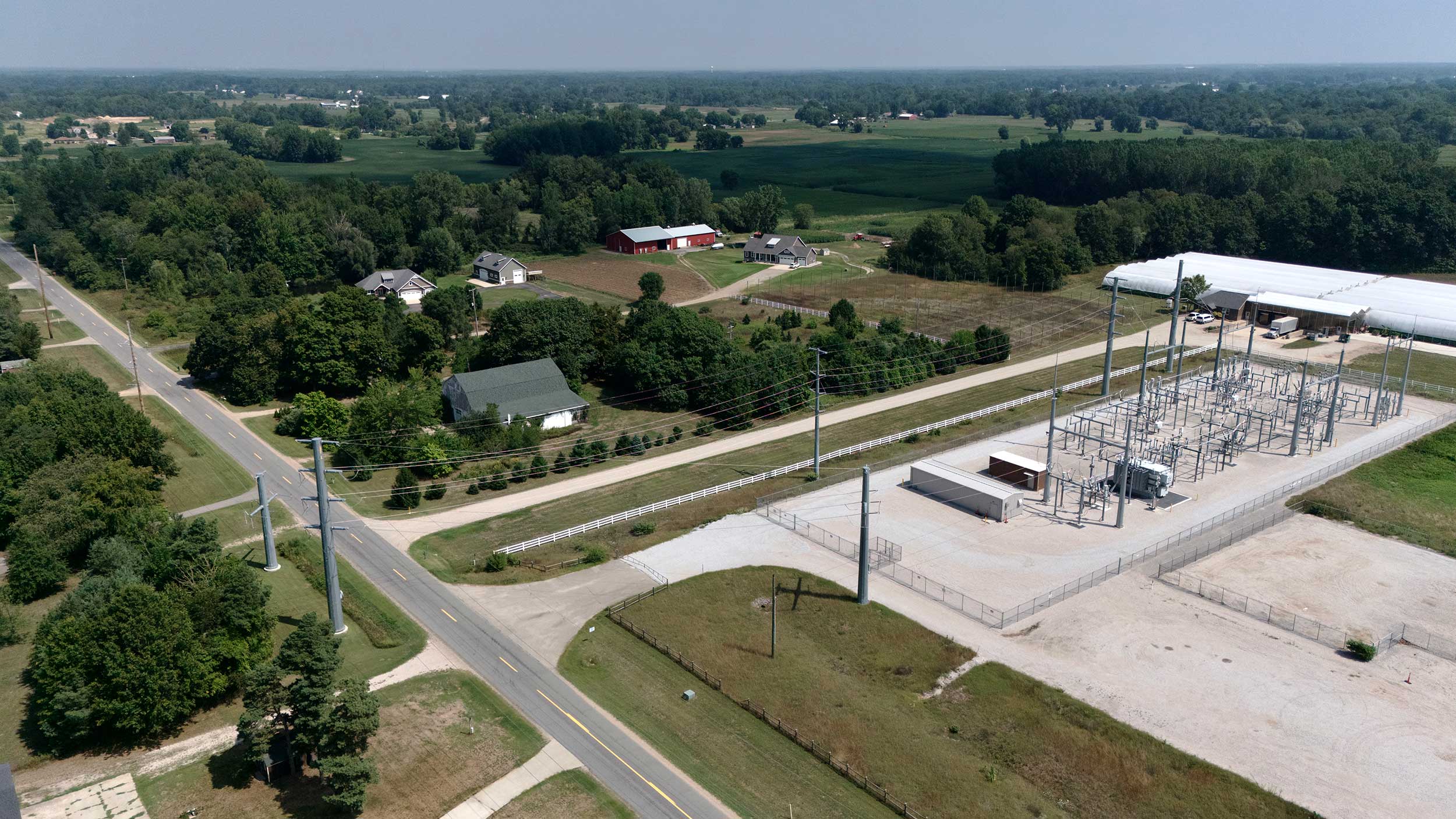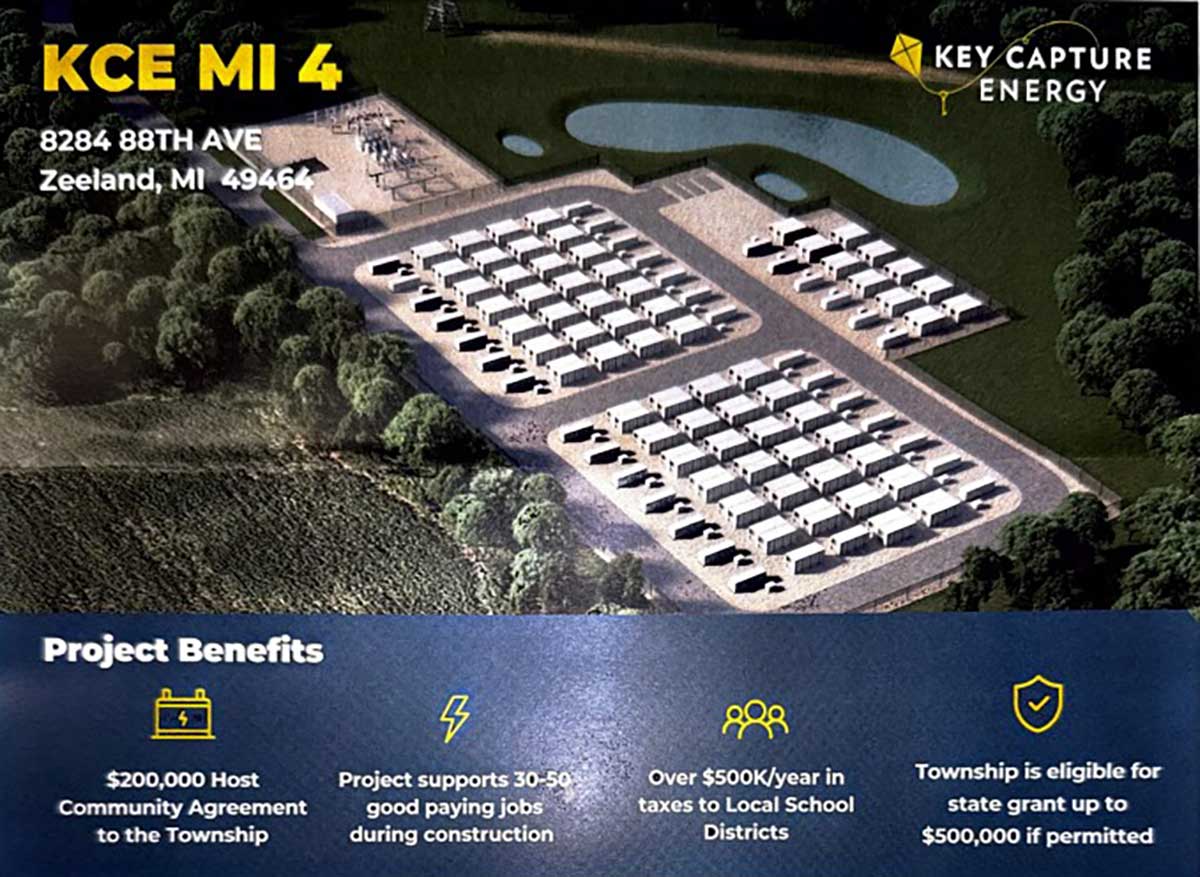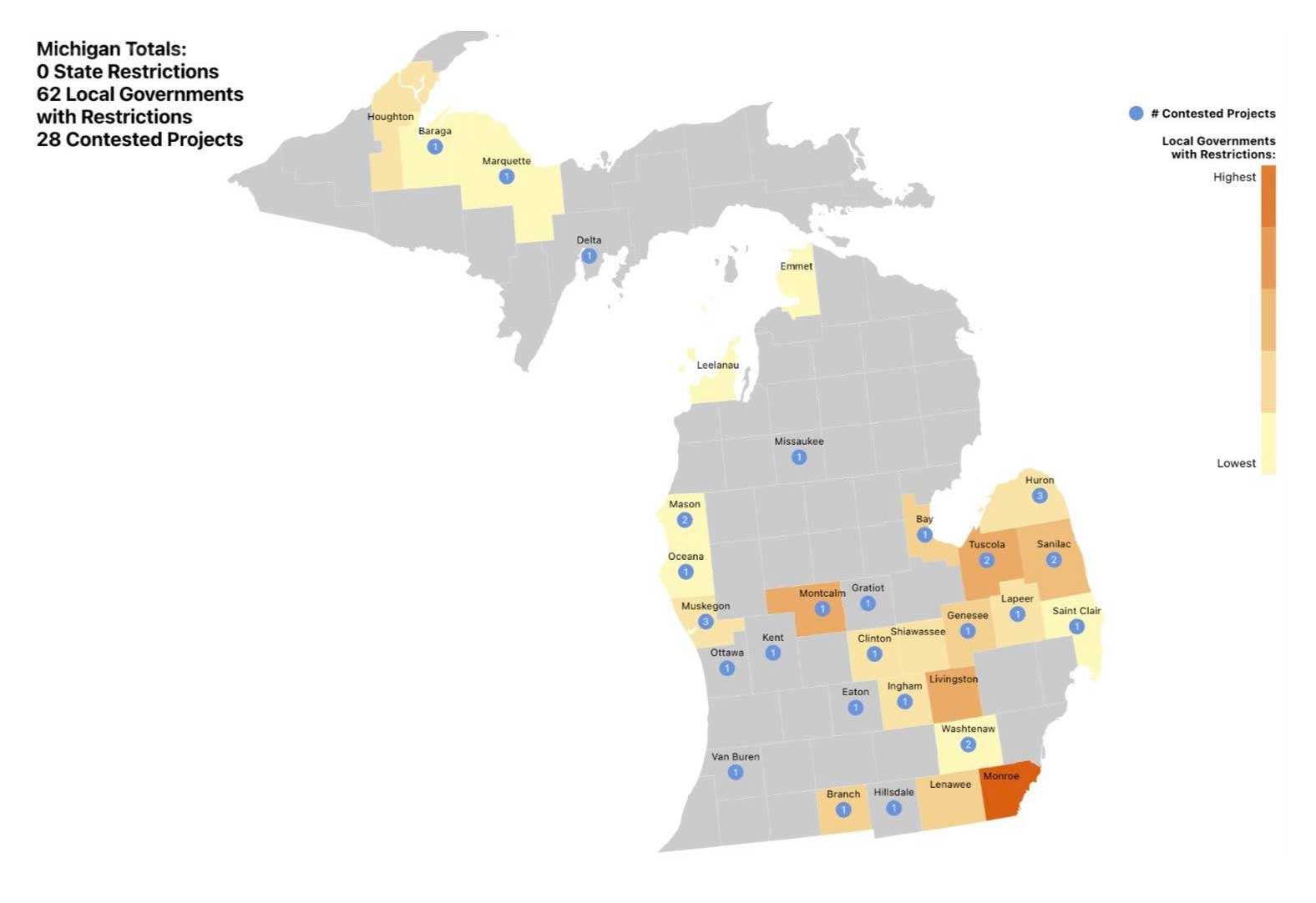

Though an application for Special Land Use has yet to be filed, the building of a Battery Energy Storage System (BESS) in Blendon Township looks imminent.
The proposal in the works is from Key Capture Energy (KCE), a Korean-owned company, and would set containers holding lithium batteries on a slab of cement covering 14 acres.
The purpose of the BESS would be to draw off the current energy lines to fill the batteries. Then, when there’s low energy somewhere on the grid, the energy would be put back onto the lines. A caveat is that the added energy wouldn’t necessarily be for Blendon Township. It would go to where it's needed. As some residents have noted, that puts the risk on their township with no guarantee of a benefit.
How did the idea to store energy in lithium battery containers happen to land on the rural, farming community of Blendon Township? In 2022, KCE knocked on the right farmer’s door and signed a 20-year lease.
Apparently, companies showing up at the doors of Blendon Township farmers and looking to buy land is not unusual. Local farmer Sally Cronkright said there have been many companies coming around asking to put solar panels on her family's fields. One company even went so far as to tell her husband she’d already agreed on a contract, which she hadn’t. According to Cronkright, the majority of local farmers would never sell or lease to an energy company. There would be no amount of money that could convince them to give up their way of life and the environment they hold dear.
But there is one farmer who doesn't seem to feel that way. And once that farmer's lease was signed by KCE, the Blendon Township Board and Planning Commission began discussions. Unless residents happened to attend one of the 2023 public meetings, there was no indication of the possibility for adding a BESS to the township. However, nothing moved forward at this stage.


On November 28, 2023, Governor Gretchen Whitmer, approved Public Act 233, which wouldn’t go into effect until a year later. Essentially, PA233 holds that if a township doesn’t allow energy companies to come in, the state will bypass the township and put the energy company there anyway. Prior to 2024, there were two recent incidents when Ottawa County fought back—once to restrict solar wind farms and another to reduce a project for offshore wind turbines.
With PA 233, townships have few choices but to move forward and adopt BESS zoning ordinances. This is what happened in Blendon Township.
According to Blendon Township Fire Chief Kurt Gernaat, because of Public Act 233 the project will most likely move forward. But with the township taking control instead of the state, they will have the authority to insert some stipulations.
Chief Gernaat said some of those stipulations may include asking for additional spacing between units to give them better access, since his department fights fires with tankers and not hydrants. He might request that a water tank be added to the site or that he be supplied with another fire truck. He's also considering asking for trees to be planted around the perimeter to hide the containers from view and for a greater setback than the state requires. Chief Gernaat is still getting an understanding of what can and can’t be done. He said having the project under township control where there can be additional requirements could “maybe make it a little bit more palatable.”
Since PA233 went into effect, there have been challenges to the Act. In Otsego County there is an unconfirmed report that Judge Colin G. Hunter ruled on July 9 in favor of the township, deciding that local units of government do not have to follow Public Act 233.
A map from 2024 shows 28 contested renewable energy projects across the state.

The requirements of PA233 affect residents on several levels. It’s more than having no say in solar versus coal. It’s more than having an eyesore potentially screened with trees.
Residents say it would be risking the very environment. Fires, which these facilities are known to have, can put hazardous chemicals into their air and soil.
And while all smoke contains pollutants and toxins, a fire from a BESS carries such toxic chemicals that it can require evacuation.
Last year, in Escondido, California, one of the containers at a BESS facility caught fire. Residents were evacuated and not allowed to return to their homes for two days until the Hazardous Materials Division and Health Department deemed the air and water quality safe. According to reports, the City of Escondido listed the following warning on its website to instruct evacuation: "Immediate threat to life. This is a lawful order to leave now. The area is lawfully closed to public access."
Generally, evacuations can have up to a five-mile radius. In the Moss Landing, California BESS fire, approximately 1500 residents had to be evacuated.
What happens on the farms when there's an evacuation? What will the air do to the crops? How will the toxins affect the lungs of the livestock that are left behind? And when the air is clear enough for residents to return, what particulates remain that will be breathed in? And how will the contaminants settle into the ground? And not only the ground... the aquifer?
According to Blendon Township’s website, groundwater tables are dropping and there is concern over depletion. The Township states:
“Blendon Township and Ottawa County are proactively responding to groundwater depletion by halting certain developments and placing environmental sustainability ahead of rapid growth. Long-term solutions will likely require regional collaboration, investment in water infrastructure, and potential exploration of alternative water sources or aquifer recharge initiatives. Our immediate response is to preserve the remaining groundwater for essential use only. Asking residents to be mindful of how we are using this valuable resource.”
So, in a township with an aquifer in a depleted state, where residents have been asked to watch their water use—that township would approve KCE's proposal to put down 14 acres of concrete. And for those who need a visual—14 acres would be the equivalent of covering a little more than ten side-by-side football fields with cement. What would blocking that amount of ground from rainwater do to an already depleted aquifer?
If there's a fire, what happens outside the cement as water is used to contain the blaze? Will the water take toxins and contaminants from the batteries down into the ground, into the aquifer, and into residents' wells?
“All definite concerns and things that are going into consideration,” Chief Gernaat said.

Local resident and farmer Bev Horinga has been studying the situation and raising questions: “We're looking at ruining and disrupting the habitat and the ecosystem around us. The biodiversity that we're gonna lose is incredible. There've been no studies done for the soil. Is it even going to be stable enough to hold 14 acres of concrete and hundreds of containers? And when KCE’s lease is up in 20 years, how will the containers be disposed of? Once the battery containers have been sitting on the land all of that time, the land is pretty much useless. So is that what we want to do to our environment?”
"Our rural life is being turned into an industrial site,” Horinga said.
If/When KCE applies for a Special Land Use Permit there will be a Public Hearing in an upcoming Planning Commission meeting which will be noticed on the Township website and in the newspaper.
The next meeting of the Blendon Township Board will be Monday, August 18 at 7:00pm.
The next meeting of the Planning Commission will be Wednesday, September 3 at 7:00pm.
Until then, residents can join others sharing their concerns on the Township Facebook page.

Krista Yetzke is a native of Ottawa County. A jeep-driving, guitar-playing wife, mom, and everyday adventurer, Krista was raised on the love of Jesus, the great outdoors, the arts, the value of frugality, and the beauty of food as medicine.